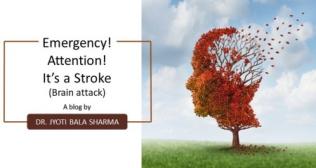
Brain Tumor - Symptoms & Treatment
Overview
A brain tumor, also known as an intracranial tumor, is characterized by an unusual growth & multiplication of cells which, in turn, results in an abnormal mass of tissue forming within the brain. Although the diagnosis of a brain tumor can sound like a life-threatening situation, there are two things to keep in mind:
- A brain tumor, in most cases, does not spread to other parts of the body.
- In more than 50 percent of cases, brain tumors are benign or non-cancerous in nature and respond well to treatment.
Doctors usually classify brain tumor as either primary or metastatic/secondary tumors and can be further grouped as benign or malignant. Metastatic tumors account for nearly 30 percent of all brain tumors and are five times more common. In most cases, they are benign. It’s also been reported that there are more than 120 varieties of tumors which affect the brain and central nervous system and hence every case may entail the need for different treatment options.
Symptoms of Brain Tumors
Depending on the type of tumor, size, and the location of the brain tumor, symptoms may differ. Moreover, in about one-third of people, it’s been observed that no prominent symptoms were discovered. Accordingly, some of the general symptoms include:
- Severe & recurrent headaches especially in the morning
- Eyesight problems including loss of vision/double vision or abnormal eye movements
- Changes in personality
- Seizures or convulsions
- Speech issues including difficulties in comprehending, speaking or articulating
- Personality changes
- Short-term memory loss
- Dizziness/Nausea accompanied by bouts of vomiting
- Loss of balance resulting in having a hard-time walking properly
- Weakness or paralysis in one side of the body
- Hearing changes
- Sluggish responses, facial numbness or tingling
- Poor eye-hand coordination, confusion, and disorientation
No matter what symptoms you might display, it’s important to meet your physician and discuss with him at length about all your possible signs so that everyone is on the same page.
Suggested Treatment Methods
Owing to the existence of several types of brain tumors, diagnosing a brain tumor can be a complex procedure. This is why the process can necessitate the involvement of a team of several specialists and doctors consisting of a neurosurgeon, an oncologist, a radiation oncologist, a radiologist, a neuropsychologist, a neurologist, a neuro-ophthalmologist, and even a speech therapist.
Usually, the first step involves getting a brain scan – an MRI more often than not. Suggested treatment alternatives are usually suggested on a case-by-case basis. Other factors which are taken into account in determining treatment is analyzing where the tumor has spread, your general health and your current age. Thereafter, treatments are usually used as a stand-alone procedure or in various combinations.
Majority of the times, treatment through surgical removal of the tumor present in the brain is usually recommended to minimize the chance of recurrence. Getting rid of a tumor becomes paramount especially if it threatens important brain structures. In that regard, more often than not, tumors can usually be removed with virtually no damage being caused to the brain. The ultimate goal of surgery is to clear away all or as much of the tumor as possible through surgery to minimize the chance of recurrence.
However, in cases where removal of a tumor is difficult – especially if it runs the risk of destroying critical parts of the brain – measures such as radiation therapy, stem cell transplantation, and chemotherapy are generally advocated. For instance, there might be a possibility that despite surgically removing the major part of the tumor, there might be some residual tissue still left within the brain. In this scenario, that part of the brain can be treated with the aid of radiation. Furthermore, it goes without saying that every treatment procedure is accompanied by their own set of risks and side-effects. It also needs to be stated that in the case of malignant, residual or recurrent tumors, radiation and chemotherapy are suggested.
In some situations, complementary therapies are also proposed to reduce the symptoms and cope with the stress of cancer. Therapies include stress management, relaxation and meditation, group support, family counseling, nutritional advice, massage, and acupuncture which can help an individual, manage his or her symptoms in a more effective manner.



















